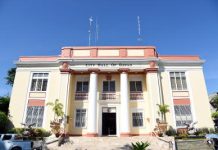After incurring P2.7 Billion debt and losing seven lives in the process, the National Electrification Administration-administered Davao del Norte Electric Cooperative, Inc. (DANECO,Inc.) looked set to turn things around by ending a 20-year conflict with its ‘break-away’ namesake.
“We are almost there,’ said Mario Angelo Sotto, the NEA-appointed DANECO, Inc. supervisor and head of the Task Force Duterte said on Tuesday.
The task force has been assigned to oversee the operations of the Daneco, Inc. in its bid to provide a “stronger, unified and competitive electric facility” for provinces of Davao del Norte and Compostela Valley.
The task force has since drawn up a road map up to strengthen management and to thresh out its differences with the “break-away” Cooperative Development Authority-aligned DANECO.
On November 9, the NEA has ordered the CDA-backed DANECO to cease and to desist from collecting payments from consumers. It also closed down the main office and six collection centers of the group.
At the same time, the NEA has advised member-consumers to pay their bills to DANECO,Inc.
Mismanagement attributed to previous officials of the power utility has led to the formation of the CDA-registered break-way group that triggered a legal conflict. Each angled for the right to represent 200,000 consumers in both provinces.
The squabble reached all the way the Supreme Court where the CDA-backed group’s actions were declared illegal.
In the meantime, the DANECO, Inc. had accumulated P2.7 billion in debts from suppliers. At least seven people working for the utility firm were killed, the latest a lineman who was implementing a disconnection order. All deaths remained unsolved.
The assumption of Task Force Duterte in March this year was backed by local officials of both provinces who saw the need for reforms in DANECO’s financial, institutional, technical operations.
Under the task force, DANECO’s operation took a new impetus and direction. Backed by a congressional franchise, it also established and strengthened possession by acquiring business permit, Bureau of Internal Revenue registration, Energy Regulatory Commission registration, tax identification number, and power contracts with suppliers.
“In contrast, the renegade group has none of these requirements,” said legal counsel Daniel Campoamor.
In the intervening months, DANECO was able to reduce its P2.7 debt to P2.1 billion as of October. It also registered its highest collection for the same month with P443 million.
Sotto said the power utility has offered the break-way group ‘to join forces’ in a bid to end the conflict once and for all. He said it also offered to grant early retirement or absorb personnel from the other group.
“Finally, we can hire them as contractors in the collection of taxes,” he said.
Sotto said the break-away group has not responded in kind but may yet realize the futility of its position to concede eventually.






